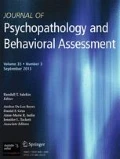Abstract
Recent studies suggest deficits in set-shifting ability in patients with obsessive-compulsive disorder (OCD) as measured by tasks such as the Wisconsin Card Sorting Test (WCST; Berg, 1948). The present study examined the extent to which these deficits were demonstrated by nonclinical subjects selected on the basis of their checking scores on the Maudsley Obsessional-Compulsive Inventory. A multivariate analysis revealed that frequent checkers performed significantly worse on the WCST than noncheckers, making more total errors and more perseverative errors and requiring more time to complete the test. A follow-up analysis on a subset of the original sample found similar performance deficits in checkers. While the poorer performance of checkers could be statistically accounted for by anxiety during the first administration of the WCST, anxiety could not explain the relationship between checking status and WCST performance at follow-up. Therefore, there does appear to be some relationship between checking status and WCST performance beyond what can be explained by affective variables.
Similar content being viewed by others
References
Beck, A. T., Ward, C. H., Mendelson, M., Mock, J., & Erbaugh, J. (1961). An inventory for measuring depression.Archives of General Psychiatry, 4, 561–571.
Beech, H. R., & Liddell, A. (1974). Decision making, mood states and ritualistic behaviour among obsessional patients. In H. R. Beech (Ed.),Obsessional states. London: Methuen.
Behar, D., Rapoport, J. L., Berg, C. J., Denckla, M. B., Mann, L., Cox, C., Fedio, P., Zahn, T., & Wolfman, M. G. (1984). Computerized tomography and neuropsychological test measures in children with obsessive-compulsive disorder.American Journal of Psychiatry, 141, 363–369.
Benton, A. L. (1973). The measurement of aphasic disorders. In M. D. Lezak (Ed.),Neuropsychological assessment. New York: Oxford University Press.
Berg, E. A. (1948). A simple objective technique for measuring flexibility in thinking.Journal of General Psychology, 39, 15–22.
Broadbent, D., Cooper, P., FitzGerald, P., & Parkes, K. (1982). The cognitive failures questionnaire (CFQ) and its correlates.British Journal of Clinical Psychology, 21, 1–16.
Butters, N., Sceldner, C., & Fedio, P. (1972). Comparison of parietal and frontal lobe spatial deficits in man: Extra personal vs. personal (egocentric) space.Perceptual and Motor Skills, 14, 27–34.
Frost, R. O., Lahart, C. M., Dugas, K. M., & Sher, K. J. (1988). Information processing among non-clinical compulsives.Behaviour Research and Therapy, 26, 275–277.
Frost, R. O., Sher, K. J., & Geen, T. (1986). Psychopathology and personality characteristics of nonclinical compulsive checkers.Behaviour Research and Therapy, 24, 133–143.
Gordon, P. K. (1985). Allocation of attention in obsessional disorder.British Journal of Clinical Psychology, 24, 101–107.
Harris, M. E. (1990).Wisconsin Card Sorting Test: Computer version. Version 1.0 (computer program and manual). Odessa, FL: Psychological Assessment Resources, Inc. (Item No. D1600-CP).
Harvey, N. S. (1986). Impaired cognitive set-shifting in obsessive compulsive neurosis.IRCS Medical Science, 14, 936–937.
Head, D., Bolton, D., & Hymas, N. (1989). Deficits in cognitive shifting ability in patients with obsessive-compulsive disorder.Biological Psychiatry, 25, 929–937.
Insel, T. R., Donnelly, E. F., Lalakea, M. L., Alterman, I. S., & Murphy, D. L. (1983). Neurological and neuropsychological studies of patients with obsessive-compulsive disorder.Biological Psychiatry, 18, 741–751.
Nelson, H. E. (1976). A modified card sorting test sensitive to frontal lobe defects.Cortex, 12, 313–324.
Newcombe, F. (1969).Missile wounds of the brain. London: Oxford University Press.
Otto, M. W. (1990). Neuropsychological approaches to obsessive-compulsive disorder. In M. A. Jenike, L. Baer, & W. E. Minichiello (Eds.),Obsessive-compulsive disorders: Theory and management. Chicago: Year Book Medical.
Rachman, S., & Hodgson, R. (1980).Obsessions and compulsions. Englewood Cliffs, NJ: Prentice-Hall.
Reed, G. S. (1977). Obsessional personality disorder and remembering.British Journal of Psychiatry, 130, 177–183.
Sher, K. J., & Goodwin, A. H. (1991).Prevalence of DSM-III-R disorders in nonclinical compulsive checkers. Unpublished raw data.
Sher, K. J., Frost, R. O., & Otto, R. (1983). Cognitive deficits in compulsive checkers: An exploratory study.Behaviour Research and Therapy, 21, 357–363.
Sher, K. J., Mann, B., & Frost, R. O. (1984). Cognitive dysfunction in compulsive checkers: Further explorations.Behaviour Research and Therapy, 22, 493–502.
Sher, K., Frost, R., Kushner, M., Crews, T., & Alexander, J. (1989). Memory deficits in compulsive checkers: Replication and extension in a clinical sample.Behaviour Research and Therapy, 27, 65–69.
Spielberger, C., Gorsuch, R., & Lushene, R. (1970).STAI Manual. Palo Alto, CA: Consulting Psychologists' Press.
Author information
Authors and Affiliations
Rights and permissions
About this article
Cite this article
Goodwin, A.H., Sher, K.J. Deficits in set-shifting ability in nonclinical compulsive checkers. J Psychopathol Behav Assess 14, 81–92 (1992). https://doi.org/10.1007/BF00960093
Accepted:
Issue Date:
DOI: https://doi.org/10.1007/BF00960093




